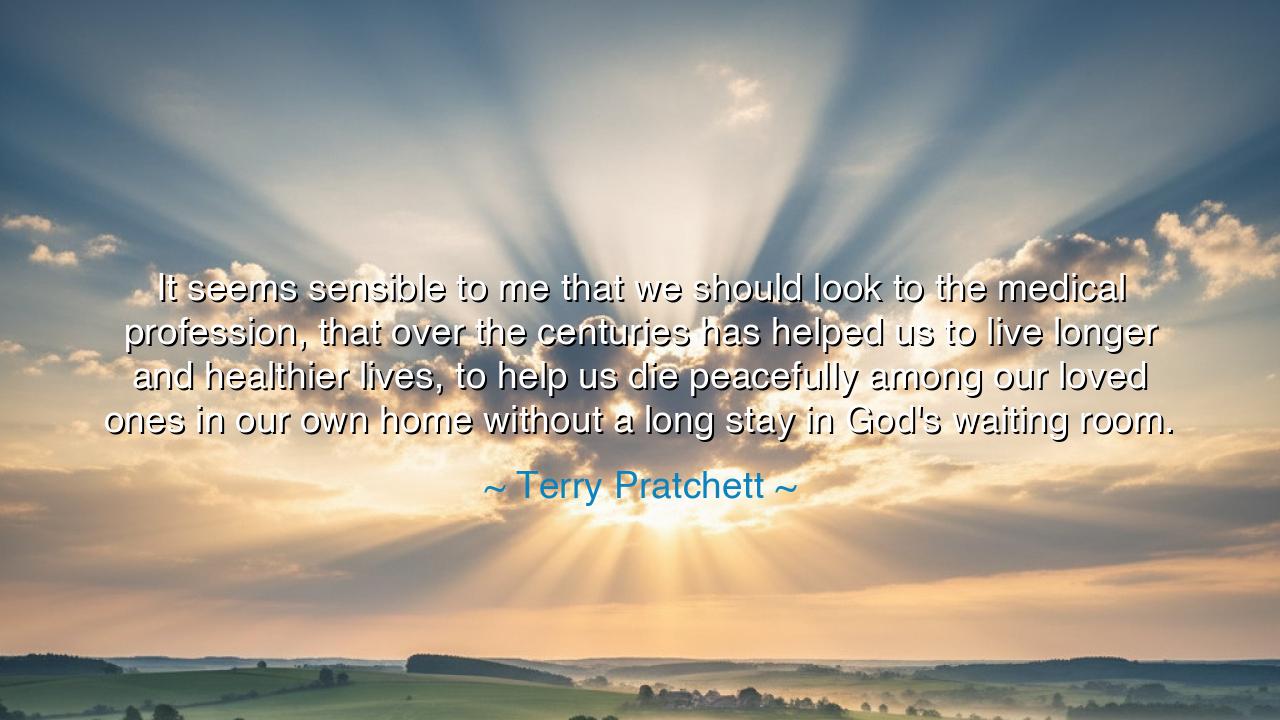
It seems sensible to me that we should look to the medical
It seems sensible to me that we should look to the medical profession, that over the centuries has helped us to live longer and healthier lives, to help us die peacefully among our loved ones in our own home without a long stay in God's waiting room.






Hear now the words of Terry Pratchett, a man of wit and wisdom, who in the twilight of his own days spoke with both sorrow and courage: “It seems sensible to me that we should look to the medical profession, that over the centuries has helped us to live longer and healthier lives, to help us die peacefully among our loved ones in our own home without a long stay in God’s waiting room.” In this declaration lies no bitterness, but a plea for dignity—a call to see death not as the enemy to be delayed at all costs, but as a natural threshold that should be crossed with gentleness, love, and respect.
The meaning of his words is both clear and profound. For centuries, the medical profession has devoted itself to the preservation of life, battling disease, and extending the span of our days. Yet Pratchett reminds us that true healing is not only in prolonging life, but in easing its end. To die peacefully, surrounded by those we love, in the sanctuary of one’s own home, is a gift as precious as any cure. He speaks against the image of “God’s waiting room,” where the elderly linger in sterile institutions, stripped of familiarity, waiting not for life but for the inevitable approach of death. His plea is for compassion—that medicine, which has carried us into long life, should also guide us into a good death.
The origin of these words flows from Pratchett’s own life. Stricken with early-onset Alzheimer’s, he knew the cruel erosion of the mind, the slow theft of selfhood. Out of this struggle, he became a powerful advocate for the right to assisted dying, believing that individuals should have the freedom to choose dignity over prolonged suffering. His words are not abstract philosophy, but the cry of one who felt the shadow of decline drawing near, and who sought not endless days, but a meaningful and merciful end.
History has known others who shared this vision. Consider Socrates, who when condemned to death by the Athenians, accepted his fate with calmness, drinking the hemlock in peace among his disciples. Though unjustly sentenced, he showed that the manner of one’s death could carry dignity and even teaching. Or recall the great Florence Nightingale, who revolutionized medicine not only for the living but also for the dying, insisting that comfort, cleanliness, and compassion were owed even when cure was no longer possible. Their stories echo Pratchett’s call: that medicine should not abandon us at the door of death, but walk beside us through it.
The emotional force of his words comes from their blending of gratitude and demand. He honors the centuries of healing that gave humanity longer and healthier lives, yet he insists that the final stage of life deserves the same devotion. It is a call to widen the purpose of medicine, from merely fighting death to ensuring that when death comes, it comes with grace. In this balance—between life extended and death dignified—lies the true nobility of the healer’s art.
The lesson for us is clear: do not measure medicine only by how many years it adds to life, but also by the peace it brings at life’s end. If we love our families, our elders, and ourselves, we must strive to make death less fearful, less lonely, less bound to cold corridors. We must advocate for care at home, for palliative medicine, for choices that honor dignity. To do less is to betray the very purpose of healing, which is not simply survival, but the preservation of human worth.
Therefore, let your actions reflect this wisdom. Speak openly of death, rather than hiding it in fear. Support those who care for the dying, and call upon leaders and physicians to ensure that medicine serves not only life but also death. In your own home, surround those in their last days with love, patience, and presence. In this way, you honor both them and the gift of life itself.
And so, remember the teaching of Terry Pratchett: the task of medicine is not only to help us live longer, but to help us die well. To depart this world gently, with dignity, and in the embrace of loved ones, is not weakness but victory—a final act of grace in the journey of life.






AAdministratorAdministrator
Welcome, honored guests. Please leave a comment, we will respond soon